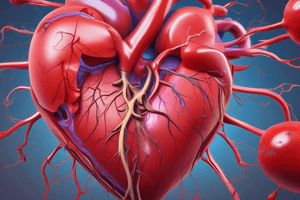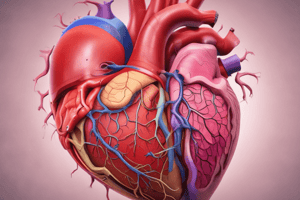Podcast
Questions and Answers
A patient presents with hypertension, and their medical history reveals long-term kidney disease. Which type of hypertension are they most likely experiencing?
A patient presents with hypertension, and their medical history reveals long-term kidney disease. Which type of hypertension are they most likely experiencing?
- Secondary hypertension, resulting from the kidney disease. (correct)
- Isolated systolic hypertension, common in older adults.
- Primary hypertension, due to the idiopathic nature of the condition.
- Resistant hypertension, requiring multiple medications for control.
Which mechanism directly contributes to increased peripheral resistance in hypertension?
Which mechanism directly contributes to increased peripheral resistance in hypertension?
- Atherosclerosis leading to narrowed arterial diameter. (correct)
- Vasodilation caused by nitric oxide deficiency.
- Increased stroke volume and reduced cardiac contractility.
- Decreased blood viscosity and enhanced vascular compliance.
A patient with primary hypertension is advised to modify their lifestyle. Which combination of changes would be most effective in managing their blood pressure?
A patient with primary hypertension is advised to modify their lifestyle. Which combination of changes would be most effective in managing their blood pressure?
- Maintain current diet and begin taking over-the-counter decongestants.
- Start smoking to relieve stress and lower cholesterol through diet alone.
- Increase sodium intake and reduce physical activity.
- Reduce sodium intake, increase physical activity, and manage stress. (correct)
Which of the following conditions is least likely to be a cause of secondary hypertension?
Which of the following conditions is least likely to be a cause of secondary hypertension?
How does uncontrolled hypertension increase the risk of myocardial infarction (heart attack)?
How does uncontrolled hypertension increase the risk of myocardial infarction (heart attack)?
A patient with a family history of hypertension, obesity, and a sedentary lifestyle is diagnosed with elevated blood pressure. Which type of hypertension is the patient most likely experiencing?
A patient with a family history of hypertension, obesity, and a sedentary lifestyle is diagnosed with elevated blood pressure. Which type of hypertension is the patient most likely experiencing?
Which of the following mechanisms is most directly responsible for the increased cardiac workload associated with long-term uncontrolled hypertension?
Which of the following mechanisms is most directly responsible for the increased cardiac workload associated with long-term uncontrolled hypertension?
A patient's blood pressure remains elevated despite adhering to a low-sodium diet and engaging in regular exercise. Further testing reveals the presence of a previously undiagnosed endocrine disorder. Which condition is most likely contributing to the patient's hypertension?
A patient's blood pressure remains elevated despite adhering to a low-sodium diet and engaging in regular exercise. Further testing reveals the presence of a previously undiagnosed endocrine disorder. Which condition is most likely contributing to the patient's hypertension?
A researcher is studying the long-term effects of hypertension on cardiovascular health. Which of the following pathological changes is most directly linked to increased risk of heart failure in hypertensive patients?
A researcher is studying the long-term effects of hypertension on cardiovascular health. Which of the following pathological changes is most directly linked to increased risk of heart failure in hypertensive patients?
A patient with a history of controlled hypertension is prescribed a new medication for an unrelated condition. Shortly after starting the new medication, their blood pressure becomes significantly elevated. Which class of medications is most likely to have caused this effect?
A patient with a history of controlled hypertension is prescribed a new medication for an unrelated condition. Shortly after starting the new medication, their blood pressure becomes significantly elevated. Which class of medications is most likely to have caused this effect?
Flashcards
Hypertension
Hypertension
High blood pressure.
Hypertension Pathophysiology
Hypertension Pathophysiology
Increased peripheral resistance and/or increased cardiac output.
Atherosclerosis in Hypertension
Atherosclerosis in Hypertension
Hardening and narrowing of the arteries, contributing to increased peripheral resistance.
Primary Hypertension
Primary Hypertension
Signup and view all the flashcards
Secondary Hypertension
Secondary Hypertension
Signup and view all the flashcards
Peripheral Resistance
Peripheral Resistance
Signup and view all the flashcards
Cardiac Output
Cardiac Output
Signup and view all the flashcards
Hypertension Effects
Hypertension Effects
Signup and view all the flashcards
Primary Hypertension Risk Factors
Primary Hypertension Risk Factors
Signup and view all the flashcards
Causes of Secondary Hypertension
Causes of Secondary Hypertension
Signup and view all the flashcards
Study Notes
- Hypertension is high blood pressure
- Hypertension pathophysiology involves increased peripheral resistance and/or increased cardiac output
- Increased peripheral resistance may be due to atherosclerosis
- Atherosclerosis is a contributing factor in many hypertension cases
- Hypertension forces the heart to work harder to pump blood
- Over time, hypertension can damage the heart and blood vessels
- Hypertension increases the risk of myocardial infarction (heart attack) or stroke
Primary vs. Secondary Hypertension
- Primary and secondary hypertension differ based on cause or risk factors
Risk Factors of Hypertension
- Risk factors vary depending on whether it's primary or secondary hypertension
Primary Hypertension
- Also called essential hypertension, it is the most common type
- It arises spontaneously or from an unknown cause (idiopathic)
- Primary hypertension is high blood pressure by itself, not caused by another disease
- Risk factors include family history, high sodium intake, obesity, smoking, stress, and hyperlipidemia (high cholesterol)
Secondary Hypertension
- Secondary hypertension is caused by a disease or a medication
- Potential causes include kidney disease, hypothyroidism, Cushing's syndrome, and pheochromocytoma
Studying That Suits You
Use AI to generate personalized quizzes and flashcards to suit your learning preferences.




